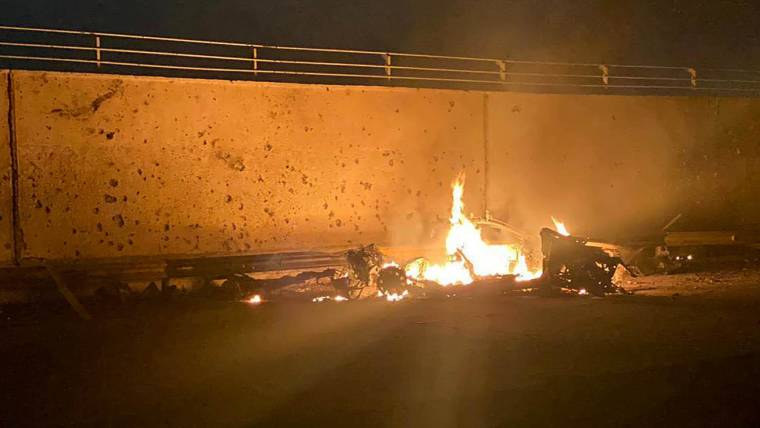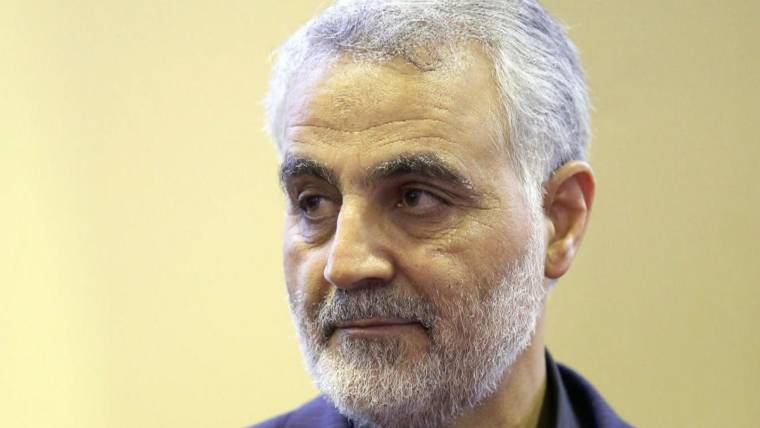WASHINGTON — President Donald Trump's decision to carry out a lethal targeted strike against an Iranian general widely said to have American blood on his hands has renewed an international legal debate about the line between warfare and assassination that has never fully been resolved.
The U.S. government justified the strike as an act of self-defense, saying that Qassem Soleimani, the leader of an elite Iranian military and intelligence unit, had been plotting attacks on Americans — an allegation that few analysts seriously doubt, given his track record as the architect of Iranian attacks abroad.
Brian Hook, the Department of State's special representative for Iran, told Al Arabiya television Friday that Soleimani was planning an attack on U.S. facilities and workers in Iraq, Lebanon, and Syria that would have killed hundreds of Americans.
But the United Nations official in charge of examining targeted killings, Agnes Callamard, questioned the operation in a series of tweets, noting that the U.S. did not detail any specific plot involving Soleimani. Under international human rights law, she noted, a country may kill in self-defense only under extremely narrow circumstances in which the lethal strike was the only option to prevent the imminent attack. She also argued that the deaths of those killed as collateral damage, including drivers and security guards, were unlawful.
Iraq's public objection to the strike in Baghdad also means it violates international law, other scholars argue.
"We have carried out the attack on the territory of a state that plainly did not give us permission," said Mary Ellen O'Connell, a law professor and an expert on international disputes at the University of Notre Dame. "The attack was unlawful, the assassination was not justifiable."
The U.S. government doesn't see it that way, and hasn't for a long time, under both Democratic and Republican administrations.
Let our news meet your inbox. The news and stories that matters, delivered weekday mornings.
"The U.S. government does not believe it is bound by human rights law treaties vis-à-vis our operations overseas," said Bobby Chesney, the James A. Baker III Chair in the Rule of Law and World Affairs at the University of Texas in Austin.
The targeted attack on Soleimani, Chesney said, resembles a World War II strike on Japanese Adm. Isoroku Yamamoto, the architect of Pearl Harbor. After U.S. intelligence learned he would be flying in the Solomon Islands area, they sent Air Force fighters to shoot down his plane in an attack code-named "Operation Vengeance."
While the U.S. technically is not at war with Iran, it appears to be in a state of armed conflict, meaning the strike can be viewed through the lens of the international laws of war, Chesney said.
In that case, the killing of a military commander is justified. And the deaths of his bodyguards and drivers are not illegal as long as the strike was "proportional" — meaning, using only the amount of force necessary to achieve the objective.
While Iraq has protested that it did not grant permission for the strike within its territory, the U.S. can argue that once invited in by Iraq, the U.S. military has the right to defend itself from threats, Chesney said.
But that view may not settle the matter, according to Scott Anderson, a former State Department adviser who is now a fellow at the Brookings Institution.
"The U.S. decision to directly target Iranian affiliates within Iraq without the permission of Congress or the Iraqi government raises a number of difficult legal and policy questions," he wrote this week in Lawfare, a website examining national security legal issues. "As a legal matter, the airstrikes are consistent with measures the United States claims the legal authority to pursue in defense of its personnel, under both domestic and international law. Yet this conclusion relies on certain idiosyncratic interpretations of international law and related facts that Iraqis are almost certain to reject, contributing to the view that U.S. actions violated Iraq's sovereignty."
The U.S. did not always view targeted killings the way it does now.
Just two months before the terrorist attacks of Sept. 11, 2001, American officials forcefully restated their position condemning missile strikes by Israel targeting specific Palestinian militants.
"The United States government is very clearly on record as against targeted assassinations," the U.S. ambassador to Israel, Martin Indyk, said at the time. "They are extrajudicial killings and we do not support that."
But after the twin towers fell and the Pentagon burned, perspectives changed. President Barack Obama, a liberal former law professor, presided over the most precise and lethal targeted killing campaign in world history. Under Obama, the U.S. carried out more than 500 strikes that killed thousands of people, according to independent groups that tracked the strikes.
And while the drone war against al Qaeda drew international condemnation, the consensus among U.S. legal experts was that it was appropriate for the U.S. to hunt and kill terrorists who were plotting attacks on Americans not only in ungoverned spaces in war zones such as Afghanistan and Iraq, but also in sovereign countries such as Pakistan and Libya.
Obama forcefully defended the legality of those strikes in a speech in 2013, during which he described self-imposed restrictions, some of which have been rolled back by the Trump administration.
But Obama also included a warning that may be applicable to the strike on the Iranian general.
"To say a military tactic is legal, or even effective, is not to say it is wise or moral in every instance," he said.
2020-01-04 16:13:00Z
https://www.nbcnews.com/news/world/was-it-legal-donald-trump-order-killing-top-iranian-general-n1109961
CAIiEJF0wbqcKGl08v3LYP7FqCIqGQgEKhAIACoHCAowvIaCCzDnxf4CMM2F8gU
Bagikan Berita Ini
















0 Response to "Was it legal for Donald Trump to order the killing of a top Iranian general? - NBC News"
Post a Comment